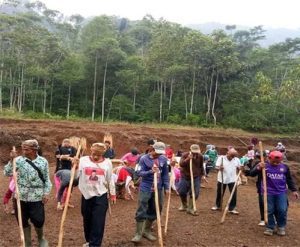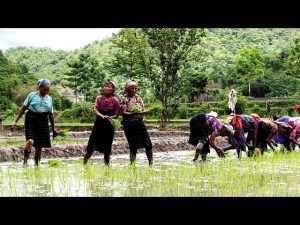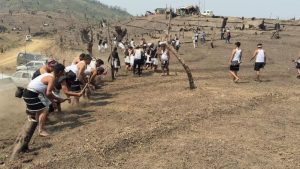In the heart of Nagaland, where modern lifestyles have slowly transformed traditional ways of life, the village of Chiechama is leading a powerful movement—a return to the roots. Through the committed efforts of the Lida Peli, a women-led group from the Angami Naga community, a significant revival of traditional farming practices has taken root. The recent rice sowing ceremony at Chiethu, organized with passion and purpose, was more than just an agricultural event. It was a celebration of cultural identity, sustainable living, and the power of community.
The Cultural Significance of Traditional Farming in Nagaland
Farming in Nagaland has historically been more than a source of income. It is deeply connected to the cultural identity of the Nagas, particularly among the Angami tribe. The agricultural cycle is filled with rituals, festivals, and communal work that strengthen social bonds and ensure the sustainability of the land. However, over time, modernization and urbanization have caused many of these practices to fade. Chiechama’s new initiative is a strong response to this decline, aiming to restore traditional values and methods in farming.
Chiechama’s Lida Peli: Guardians of Tradition
The Lida Peli, a group of dedicated women from Chiechama village, have taken it upon themselves to preserve their community’s agricultural heritage. With a rich base of knowledge passed down through generations, these women are reintroducing ancient farming techniques and encouraging their use among the youth. The rice sowing ceremony at Chiethu, a historically significant site, marked a milestone in their efforts. It served as a symbolic return to traditional values and a reaffirmation of their cultural identity.

The Rice Sowing Ceremony at Chiethu: A Cultural Spectacle
The rice sowing ceremony held at Chiethu was not just an agricultural exercise but a vibrant cultural event. Participants wore traditional Angami attire and performed age-old rituals to seek blessings for a good harvest. Songs echoed across the field, and elders led the sowing process with practiced hands. The event also included a communal meal prepared with local ingredients, reinforcing the values of unity, sharing, and sustainability that lie at the heart of traditional farming.
Engaging the Youth: Bridging Generations
A major success of the event was the enthusiastic participation of younger community members. In recent times, many young people have distanced themselves from farming due to urban migration and changing lifestyles. However, the rice sowing ceremony managed to bring them back to the field. Many were involved in sowing seeds for the first time and gained hands-on experience in traditional techniques. Through stories, songs, and interactive sessions, the event created a bridge between generations and helped revive interest in sustainable farming.
Why Traditional Farming Matters Today
Unlike industrial agriculture, traditional farming emphasizes ecological balance, biodiversity, and the well-being of both people and the land. In Nagaland’s hilly terrain, practices like shifting cultivation, terrace farming, and organic composting have helped maintain soil fertility and water conservation. These methods, rooted in local wisdom, are more resilient to climate change and environmental stress. The return to such sustainable approaches, as seen in Chiechama, offers valuable insights not just for the region but also for global discussions on food security and ecological farming.


Women at the Forefront: Lida Peli’s Empowering Role
The Lida Peli group has shown that women are not only caretakers of households but also leaders in agriculture, culture, and community development. By taking initiative in organizing the ceremony and promoting farming traditions, they have carved out a significant role for themselves in Nagaland’s rural transformation. Their work has empowered other women to take part in agricultural and social decision-making, contributing to greater gender equality in traditionally male-dominated spaces.
The Role of Community Collaboration
The success of the rice sowing ceremony was a result of collective community effort. Elders provided guidance, children participated with curiosity, and local leaders gave support. Even members of the diaspora returned to join the event, making it a truly inclusive celebration. This spirit of cooperation is essential in reviving traditional practices, as it fosters a sense of belonging and shared responsibility. Community-based farming also builds social bonds that can withstand modern challenges like migration and climate instability.
Traditional Farming as a Form of Resistance
In today’s fast-changing world, returning to traditional practices can also be seen as a form of cultural resistance. By choosing native seeds over genetically modified varieties and traditional tools over industrial machinery, communities like Chiechama are resisting cultural loss and environmental exploitation. This movement aligns with global trends that emphasize seed sovereignty, food justice, and the preservation of indigenous knowledge. It positions Chiechama as a symbol of resilience and cultural pride in the face of globalization.
Government and Policy Support: What’s Needed?
While grassroots efforts like the one in Chiechama are commendable, long-term success will require support from government and civil society. Infrastructure development, policy incentives, and training programs can help scale such initiatives. Government agencies can collaborate with local groups to promote eco-friendly farming techniques, document oral knowledge, and create platforms for sharing experiences. Educational institutions can also contribute by researching and validating the environmental benefits of traditional methods.


The Road Ahead: Expanding the Movement
The positive response to the Chiethu ceremony has inspired neighboring villages to consider similar events. Lida Peli is planning to organize more community sowing days, conduct workshops, and publish guides on traditional farming. With growing awareness, there is potential to expand this movement across the region. In doing so, they not only preserve Nagaland’s unique culture but also contribute to a global model of sustainable agriculture that respects both nature and heritage.
Conclusion
The rice sowing ceremony at Chiethu, organized by Chiechama’s Lida Peli, is a remarkable example of cultural revival, sustainability, and grassroots leadership. Through traditional farming practices, the community has rekindled a sense of pride, purpose, and unity. It shows how returning to ancestral wisdom can offer practical solutions for today’s challenges, from environmental degradation to cultural erosion. As other communities look to reconnect with their roots, Chiechama’s story stands as a beacon of hope and a powerful reminder that the seeds of change often lie in tradition.
Read More: If you’re interested in learning about other rich cultural traditions in Northeast India, explore the Unique Durga Puja Tradition of Tripura and discover how heritage and devotion come together in this vibrant celebration.

